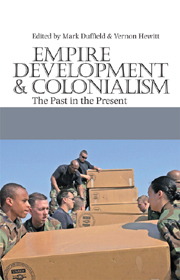Book contents
- Frontmatter
- Contents
- Acknowledgements
- Notes on Contributors
- Introduction
- 1 The Exceptional inclusion of ‘Savages’ & ‘Barbarians’
- 2 Empire, International Development & the Concept of Good Government
- 3 Empire: a Question of Hearts?
- 4 ‘Conflict-Sensitive’ Aid & Making liberal Peace
- 5 Development, Poverty & Famines
- 6 Plain Tales from the Reconstruction Site
- 7 The International Politics of Social Transformation
- 8 Liberal Interventionism & the Fragile State
- 9 Freedom, Fear & NGOs
- 10 Theorising Continuities between Empire & Development
- 11 Spatial Practices & Imaginaries
- 12 Decolonising the Borders in Sudan
- 13 ‘Individualism is, Indeed, Running Riot’
- Index
12 - Decolonising the Borders in Sudan
Ethnic Territories & National Development
Published online by Cambridge University Press: 05 February 2013
- Frontmatter
- Contents
- Acknowledgements
- Notes on Contributors
- Introduction
- 1 The Exceptional inclusion of ‘Savages’ & ‘Barbarians’
- 2 Empire, International Development & the Concept of Good Government
- 3 Empire: a Question of Hearts?
- 4 ‘Conflict-Sensitive’ Aid & Making liberal Peace
- 5 Development, Poverty & Famines
- 6 Plain Tales from the Reconstruction Site
- 7 The International Politics of Social Transformation
- 8 Liberal Interventionism & the Fragile State
- 9 Freedom, Fear & NGOs
- 10 Theorising Continuities between Empire & Development
- 11 Spatial Practices & Imaginaries
- 12 Decolonising the Borders in Sudan
- 13 ‘Individualism is, Indeed, Running Riot’
- Index
Summary
Land was one of the central issues contributing to the recent civil wars in the Sudan, and it is an underestimated and overlooked factor determining the success or failure of the Comprehensive Peace Agreement (CPA) signed in 2005 (Pantuliano 2007: 3). Land has been central to the Sudan's colonial and postcolonial development policies, and land access and land rights legislation changed as development policy changed. The systematic erosion of customary rights to land and access to land were powerful factors which drew different peoples on both sides of the North-South divide into the wider conflict, so that by the time the North-South war ended in 2005 what the ‘marginalised’ peoples of the South, East and West had in common was dispossession from their land through government encroachment. Land was ethnicised during the Anglo-Egyptian Condominum, was progressively de-ethnicised immediately prior to and during the conflicts, and is now being selectively re-ethnicised along parts of the North-South border. There is a direct conflict between customary land regimes and the development policies of the central government which has yet to be resolved, or even directly addressed, by either the Government of National Unity or the Government of South Sudan created by the CPA.
Communal Resources & Dar Rights
The Condominium government of the Sudan both assumed and confirmed the existence of discrete tribal territories throughout the rural areas of the country. Legislation in the 1920s and 1930s defining the powers of nomad sheikhs in the North and chiefs in the South reinforced the legal and, ultimately, the territorial definition of tribal groups.
- Type
- Chapter
- Information
- Empire, Development and ColonialismThe Past in the Present, pp. 176 - 187Publisher: Boydell & BrewerPrint publication year: 2009



